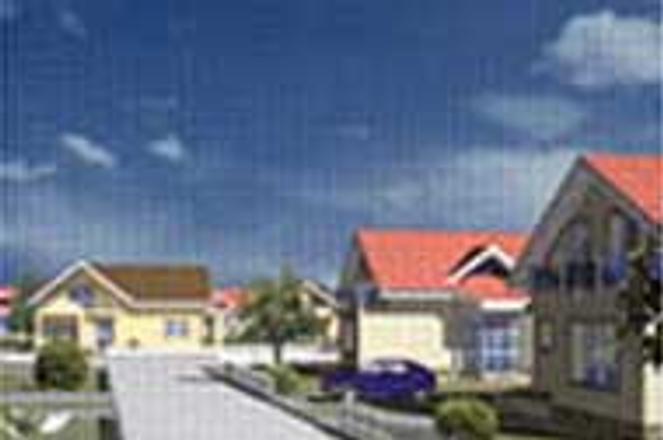Housing developments like this one planned in Rusovce, a suburb of Bratislava, are far out of the reach of most Slovak homebuyers.photo: Computer visualisation by R-Invest
Throughout the 1990's, the price of residential real estate in Bratislava has steadily and quickly risen, often leaving potential homebuyers flat out of luck. Analysts agree that the root of the problem lies in the city housing shortage, and say that the government must take steps to improve the situation.
"The situation has worsened dramatically since 1992," said Igor Federoňko, statutory representative for real estate office Bratislavská Realitná Kancelária (BRK). "In 1992, a two-bedroom flat in [the Bratislava suburb of] Petržalka would run you around 400,000 Slovak crowns [Sk]. Now, that same flat would probably cost around 1.1 million Sk."
Adriana Litomerická, director of Národna Aukčná Spoločnost, also noted the price increase. "In some cases, the price of flats has risen three-fold," she said. "Now, for a 70 square-metre flat in Dúbravka or Rača, you can expect to pay around 1.5 million Sk and over 2 million Sk in the centre."
"Rent has increased as well," Federonko added. "In '92, the average monthly rent for a one-room flat outside of the center was around 2,500 Sk. But now you're looking at 7, 8, even 9,000 Sk."
According to Federoňko, the reason for the price boom is clear. "It is simply a case of a shortage of flats," he said. "This is a new problem for us. During socialism there was one flat for every family. Now, people want their own flats, they want to start a family, but how can they?"
Federoňko added that the influx of foreigners into Slovakia has also contributed to the increased prices, particularly affecting rent.
"Foreigners can pay higher amounts, so the prices are naturally higher," he explained. "Everyone wants to rent to a foreigner because it pays better. We try to convince people that there are not enough foreigners for everyone to rent to and that they must make prices affordable for Slovaks as well."
As the prices rise, calls for government aid follow suit. Andrea Štefáková, press secretary for Jozef Moravčík, the mayor of Bratislava, told The Slovak Spectator that the mayor's office has heeded the complaints and has already taken action.
"Currently, the city council is preparing a strategy for housing construction that will be completed in a couple months," she said. "We have other projects as well. For example, since 1994, we have given subsidised flats in [the Bratislava suburb of] Dlhé Diely to over 100 married couples who have babies."
But Federoňko said that the real solution lies in the government's ability to attract private foreign investors who will build more flats in Slovakia. "Perhaps the government should change the laws and taxes in order to get them in here," he said. "The government must make Slovakia inviting. Investors can go to Hungary or Poland or the Czech Republic. They won't come here just because they think, 'Hey, I really like Slovakia!'"
Štefáková said that such steps have already been taken. "The council wants to invite investors to Bratislava, so we have offered land to them for symbolic prices, simply to get them here."
The average Slovak earns 9,200 Sk ($230) per month; given that the average flat in Petržalka sells for 20,000 Sk per square metre, a normal homebuyer must save every crown he earns for over twelve and a half years in order to buy a two-room flat of 70 square metres. The situation, Litomerická said, is so bad that it is nearly impossible for a Slovaks to purchase their own flats.
"Right now, there are really three possibilities if you don't have the money," she explained. "First, a state fund [the State Fund for Housing Development] was created to help people finance the purchase of flats, but the fund is now empty. Second, you can take a loan from a bank, but interest rates are exorbitant. The third option is to enter the construction savings programmes, which give loans at relatively better rates."
Federoňko added a note of optimism, saying that the situation can't get any worse. "Prices are starting to level out," he said. "They are so high now that people just won't go any higher. The good flats near the center of town will always be expensive, but the prices of older flats outside the centre will maintain their current levels, if not even go down a bit."
While the situation may be stabilising, buying a flat remains an unfulfillable dream for many Slovaks. Litomerická advised that in the absence of government aid or reasonable mortgage programmes, charity - and homebuying - must start at home.
"In this market, the best thing to do is to borrow money from your family or friends and buy a flat that way," she said.


